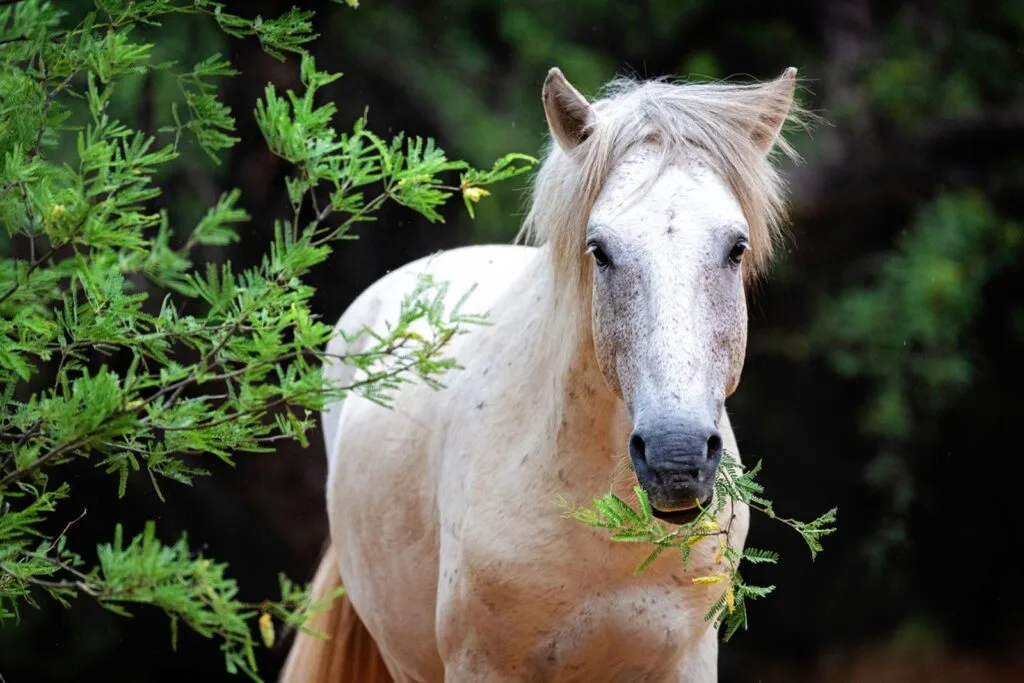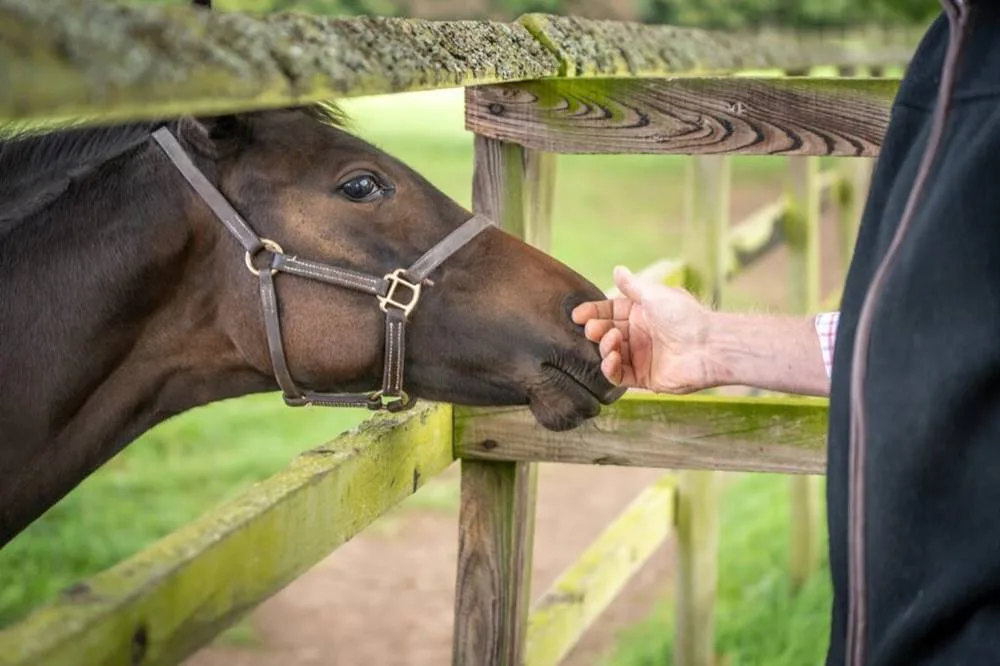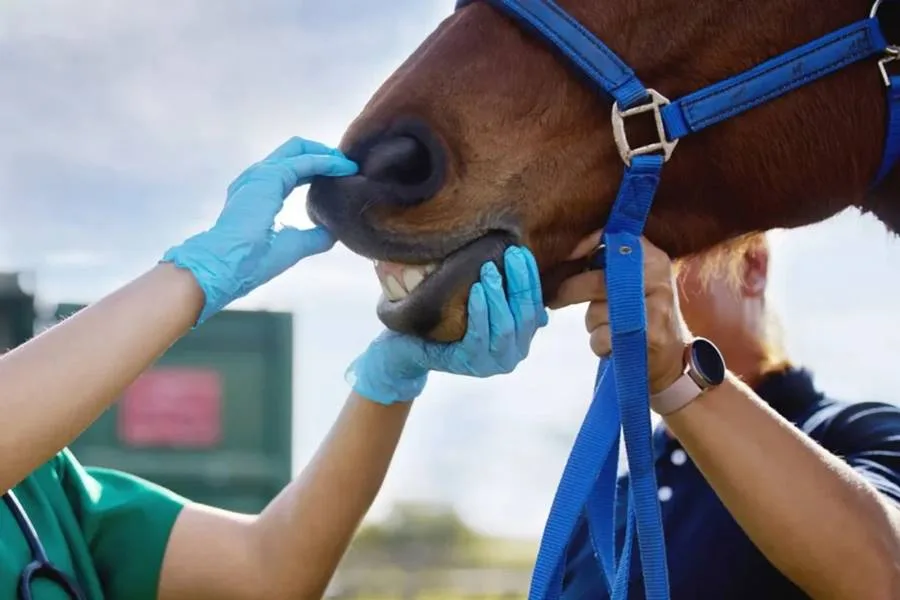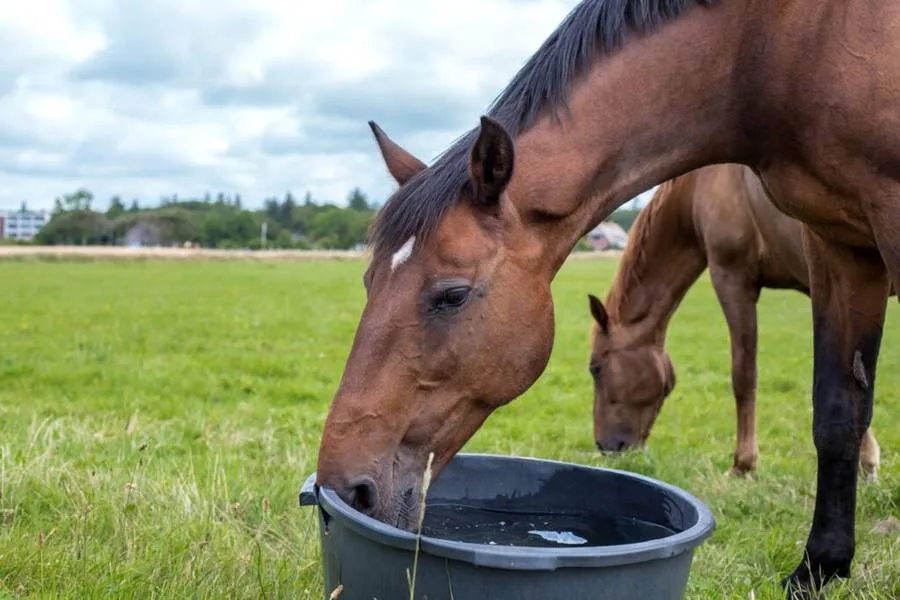There are several foods and plants that are harmful or toxic to horses.
Horses are herbivores, but their digestive systems can’t handle certain plants or foods, and consuming them can lead to serious health issues. Here’s a comprehensive list of foods and plants that are harmful to horses:
Foods Harmful to Horses:
- Chocolate: Chocolate contains theobromine, which can cause symptoms like restlessness, elevated heart rate, and seizures in horses. In severe cases, it can be fatal.
- Avocados: Avocados contain a substance called persin that is toxic to horses, leading to respiratory issues, colic, and even death in extreme cases.
- Onions: Onions contain compounds that can cause hemolytic anemia, which destroys red blood cells and can lead to weakness, lethargy, and organ failure.
- Garlic: Like onions, garlic can also cause damage to red blood cells, leading to anemia and other related health issues.
- Potatoes: Potatoes, especially the green ones, contain solanine, a toxin that can lead to digestive problems, lethargy, and neurological issues in horses.
- Tomatoes: Tomatoes (especially the leaves and stems) contain solanine, which can be toxic to horses, causing digestive problems, lethargy, and muscle weakness.
- Rhubarb: The leaves of rhubarb contain oxalates, which can cause kidney failure, difficulty breathing, and death if ingested by horses.
- Cherries (Pits and Seeds): Cherry pits contain cyanide, which is highly toxic to horses. Consuming too many cherry pits can lead to poisoning, symptoms like drooling, nausea, and even death.
- Moldy Hay or Feed: Moldy hay can cause severe respiratory issues, allergies, and colic. It’s important to ensure that hay is always dry, clean, and free from mold.
- Lawn Clippings: Lawn clippings ferment quickly and can cause colic and laminitis in horses if ingested. They can also be too rich for horses’ digestive systems.
- Bread (Stale or Moldy): While fresh bread in small amounts may not be harmful, stale or moldy bread can contain harmful fungi that cause gastrointestinal problems, liver damage, and even poisoning.
- Ice Cream and Dairy: Dairy products can cause digestive issues like diarrhea in horses since they have trouble digesting lactose.
- Nuts: Nuts are high in fat and can cause colic or choke in horses. They can also lead to digestive upset.
- Beans: Beans, especially kidney beans, contain lectins, which can irritate the stomach and intestines, causing digestive upset and even organ damage.
- Spinach: Spinach contains oxalates, which can bind with calcium in a horse’s body, leading to kidney damage or kidney stones over time.
- Peas: Peas are high in protein, but they can cause bloating, discomfort, and colic because horses’ digestive systems aren’t equipped to process legumes like peas.
- Sugary Treats: Sugary treats like candy, sugar cubes, or processed foods can contribute to insulin resistance, obesity, and laminitis, which is a painful hoof condition.
Plants Harmful to Horses:
- Yew: All parts of the yew plant, including leaves and berries, are highly toxic to horses. They contain taxine, which can cause sudden death due to heart failure, even in small amounts.
- Ivy: English Ivy is toxic to horses and can cause symptoms like digestive upset, diarrhea, and heart problems.
- Foxglove: This common garden plant contains toxins that affect the heart, leading to arrhythmias, heart failure, and death.
- Ragwort: Ragwort is one of the most dangerous plants for horses. If consumed over time, it can cause severe liver damage and even liver failure, which can be fatal.
- Oleander: Oleander is highly toxic to horses and can cause severe heart problems, including arrhythmias, and can be fatal if consumed in large quantities.
- Aconite (Monkshood): Aconite contains alkaloids that are toxic to horses and can cause severe heart issues, respiratory distress, and death.
- Laurel: Laurel, also known as cherry laurel, contains cyanogenic glycosides that release cyanide when consumed, which can be deadly to horses.
- Morning Glory: Morning Glory vines contain toxins that can lead to symptoms like hallucinations, uncoordinated movements, and in extreme cases, death.
- Holly: Holly berries are toxic to horses and can cause gastrointestinal problems, such as colic and diarrhea, and lead to poisoning if consumed in large quantities.
- Larkspur: Larkspur contains alkaloids that can cause muscle paralysis, respiratory distress, and even death in horses that consume it.
- Nightshade Plants: Nightshade plants like belladonna, deadly nightshade, and bittersweet nightshade are extremely toxic to horses and can cause symptoms ranging from digestive upset to death.
- Buckthorn: Buckthorn is toxic to horses and can cause vomiting, diarrhea, and dehydration. Ingesting large amounts can lead to even more severe issues like heart failure.
- Cicuta (Water Hemlock): Water Hemlock is considered one of the most toxic plants to horses. It can cause seizures, respiratory failure, and death if consumed.
- Horsetail: Horsetail contains thiaminase, an enzyme that breaks down vitamin B1 (thiamine). Horses that eat large amounts of horsetail can develop thiamine deficiency, leading to neurological issues, weakness, and in severe cases, death.
- Fool’s Parsley: This plant is toxic to horses and can cause severe gastrointestinal issues and damage to the liver and kidneys. Ingestion of large quantities can be fatal.
Horses are delicate creatures, and many common foods and plants are harmful to them. As a responsible horse owner, it’s essential to be aware of these dangers and take steps to prevent your horse from consuming toxic plants or harmful foods. Always be cautious when introducing new treats or plants into your horse’s environment, and when in doubt, consult your vet for advice. By keeping these harmful foods and plants away, you’ll help ensure that your horse remains healthy and safe.




